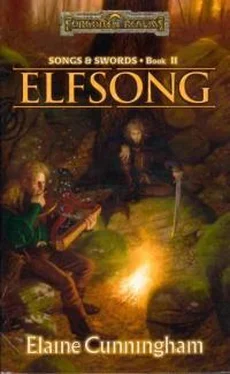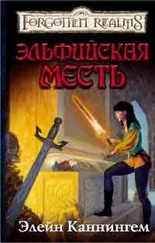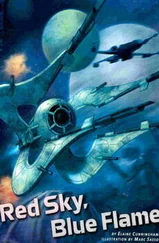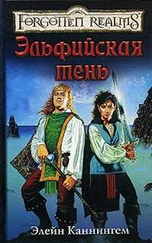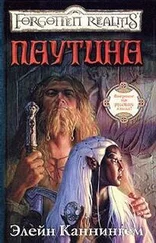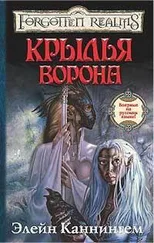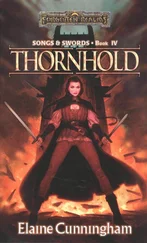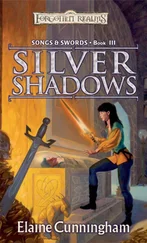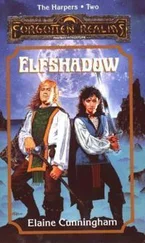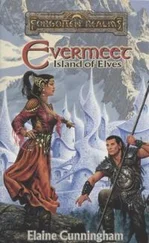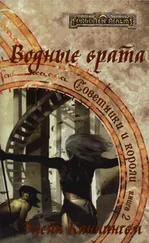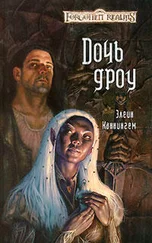Элейн Каннингем - Elfsong
Здесь есть возможность читать онлайн «Элейн Каннингем - Elfsong» весь текст электронной книги совершенно бесплатно (целиком полную версию без сокращений). В некоторых случаях можно слушать аудио, скачать через торрент в формате fb2 и присутствует краткое содержание. Год выпуска: 1994, Жанр: Фэнтези, на английском языке. Описание произведения, (предисловие) а так же отзывы посетителей доступны на портале библиотеки ЛибКат.
- Название:Elfsong
- Автор:
- Жанр:
- Год:1994
- ISBN:нет данных
- Рейтинг книги:3 / 5. Голосов: 1
-
Избранное:Добавить в избранное
- Отзывы:
-
Ваша оценка:
- 60
- 1
- 2
- 3
- 4
- 5
Elfsong: краткое содержание, описание и аннотация
Предлагаем к чтению аннотацию, описание, краткое содержание или предисловие (зависит от того, что написал сам автор книги «Elfsong»). Если вы не нашли необходимую информацию о книге — напишите в комментариях, мы постараемся отыскать её.
Elfsong — читать онлайн бесплатно полную книгу (весь текст) целиком
Ниже представлен текст книги, разбитый по страницам. Система сохранения места последней прочитанной страницы, позволяет с удобством читать онлайн бесплатно книгу «Elfsong», без необходимости каждый раз заново искать на чём Вы остановились. Поставьте закладку, и сможете в любой момент перейти на страницу, на которой закончили чтение.
Интервал:
Закладка:
Danilo tried the strings and found that the memory of the music was still in his fingers. After a moment’s thought, he began the introduction to a dwarven ballad, an old song taught to him by a bard visiting from Utrumm’s Conservatory in Silverymoon. It was a sad but dignified lament for a people and a way of life that was slowly fading from the land.
To Danilo’s surprise, Wyn Ashgrove began to sing the dwarven song with genuine feeling. After a moment, Morgalla also joined in, singing harmony in a rich alto. The deep tones of the dwarf’s voice encompassed about the same range as Wyn’s soaring countertenor, and the two voices blended as well as any duo Danilo had ever heard. As he played, the Harper listened with awe to the singers. In the elf’s silvery tones was the beauty of the sea and stars, while the rich, feminine strength of Morgalla’s voice seemed to spring from the earth and the stone: opposites, perhaps, but together forming a whole.
The last notes of the harp faded away, leaving an invisible bond between the two singers that neither had considered. Their gazes clung for a moment, then slid away, a little self-conscious. Morgalla took a deep breath and raised her eyes to Danilo. Her expression was defiant, quickly becoming bewildered as the circle broke into applause.
“Beauty, brawn, and talent!” Balindar whooped, raising his tin traveling cup to the dwarf in a salute.
“Morgalla, my dear, your voice is remarkable,” Danilo told her. She shrugged and looked away.
Wyn reclaimed his instrument from the Harper and held it out to the dwarf. “Do you play as well as sing?”
She snorted and held out her stubby-fingered hands for inspection. “With these?”
“There are instruments—even stringed instruments—that would suit you well,” Wyn told her. “Have you never heard of a hammered dulcimer?”
“Hammers, you say?” The dwarf looked interested despite herself.
The elf smiled faintly. “More like spoons than hammers, and wielded with more delicacy than one would employ at a forge, but the idea is the same. Let me show you.”
A word from the elf changed the lap harp into a small wooden box, wider at one end than the other and crisscrossed with strings. Wyn took two small beaters and began to tap the strings, showing Morgalla how the notes were arranged and then playing a snatch of the melody that they had just shared.
“Now you,” Wyn said, and handed her the beaters.
The dwarf began to play, hesitantly at first but with growing delight as she picked out one tune after another. The instrument was uniquely suited to her, combining the dwarven love of percussion instruments with Morgalla’s craving for melody. The tiny beaters fit in her hands as if made to order.
Danilo listened to Morgalla’s music with pleasure and more than a little guilt. The dwarf had come to him wanting to learn more of bardcraft, and he’d done little to fulfill her expectations or to earn her loyalty. Granted, he’d invited her to sing a couple of times, but he was quick to accept her refusal and too preoccupied to wonder what might be behind her hesitation. Wyn Ashgrove had proven to be more perceptive and thoughtful, and Danilo was grateful to the gold elf.
Dan leaned closer to Wyn and murmured, “That was kindly done. You seem to have made a conquest.”
The elf let the teasing remark pass. “Morgalla’s love of music was plain to see; her talent you can judge for yourself. She needed but the means and a little encouragement. As for the others”—Wyn nodded toward the mercenaries—“ this music will help keep their minds from the dangers ahead.”
Morgalla finally stopped, heaving a sigh of deep satisfaction. So absorbed in the music had she been that she’d forgotten about the others, and at the applause she looked up, flushed and flustered.
“Take a bow,” Danilo advised her, smiling. “Surely one with your gifts knows how to acknowledge an appreciative audience.”
“It’s been awhile,” the dwarf said wryly. “You play, bard.”
Sensing it best not to push her, Danilo got out his lute and regaled the adventurers with a ribald tale about a priestess of Sune—the goddess of love and beauty—who aspired to become the most infamous and popular hostess in Faerûn. The priestess was well satisfied with her success until a visiting ranger, unimpressed by her wild party, advised her to seek out the satyrs and take a few lessons on debauchery. She did so on a Midsummer night, and the rest of the song told about the competition of priestess and satyrs to outdo each other in merriment. It was, without doubt, the most obscene song in Dan’s considerable repertoire of off-color tales.
After the laughter and bawdy comments had died away, Danilo played a very different ballad. This was a historical tale about a long-ago battle between the Harpers and a drow elf queen who enslaved humans to work her mines. He sang the old song as it had been passed down in to him in strict bardic tradition, and doing so was an act of defiance against the power that had enspelled the bards and altered their record of the past Wyn nodded slowly, understanding the Harper’s gesture and approving.
When the tale was told, Danilo put aside the lute and motioned for Vartain, who sat just beyond the circle of firelight, gnawing at a bit of dried meat “Your turn, riddlemaster. Give us a story.”
Vartain wiped his fingers on his tunic and came into the circle. His bald pate reflected the firelight like some small, bronze moon, and the play of light and shadows across his face exaggerated the gaunt angles and prominent features. Morgalla nudged Danilo and handed him a scrap of paper. Sometime during the trip, she’d sketched Vartain as a potbellied vulture. Danilo swallowed a chuckle.
“There is an ancient tale from my homeland,” Vartain began in a rich, carefully modulated bass voice, “about a wealthy man who was blessed with two sons. As do we all, the man grew old, and he knew his time was short. He called his sons to him, saying he could not decide which of them would be his heir. This they would determine by a race. The sons were to set forth the next morning for Kaddisht, a town some twenty miles away. The son whose camel was the last to arrive would be accounted his father’s heir.
“When the sun arose, it found the two men ready for the race, dressed for travel and mounted upon their best camels. Their father gave them his blessing and wished them well, and the race was on. Each son employed every method he could think of to remain behind the other, while the beasts grew restless and the sun sank low behind the dessert. By the end of the day, the two men had gone less than a hundred paces!
“Deeply troubled, the two brothers took shelter at an inn. There they shared wine and discussed their troubles. Each man was wealthy by his own labors, and each had business affairs and families to tend. The task their father had given them had no clear end in sight In pursuing their inheritance, the men were in very real danger of perishing in the desert that lay between the inn and the town of Kaddisht The men told the innkeeper their dilemma. After a moment’s thought, the innkeeper gave them two words of advice.
“The next morning the brothers again set forth for Kaddisht, but this time they rode as fast as they could. Tell me, then, what advice did the innkeeper give them?”
There was a long silence around the campfire as the companions thought this over. One after another, they shrugged their defeat.
“The two words where these: Change camels ,” Vartain said. “The father specified that the son whose camel arrived last would become heir. Therefore, whoever won the race would now win the fortune as well.”
“Good tale,” Mange admitted. The scrawny mercenary took a swig from a tin flask and then wiped the back of his hand across his mouth. “Me, I’ve always liked riddles. Second best way to pass the time of a cold winter night!”
Читать дальшеИнтервал:
Закладка:
Похожие книги на «Elfsong»
Представляем Вашему вниманию похожие книги на «Elfsong» списком для выбора. Мы отобрали схожую по названию и смыслу литературу в надежде предоставить читателям больше вариантов отыскать новые, интересные, ещё непрочитанные произведения.
Обсуждение, отзывы о книге «Elfsong» и просто собственные мнения читателей. Оставьте ваши комментарии, напишите, что Вы думаете о произведении, его смысле или главных героях. Укажите что конкретно понравилось, а что нет, и почему Вы так считаете.
